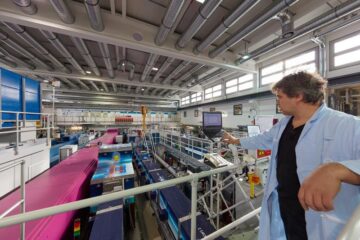Dental Implant – Optimised adhesion of gingiva through bio-nano-coating

Medicinal implants have become widely used in modern dentistry. While significant progress has been made to improve the adhesion of such dental implants to the jaw, adhesion of the gingiva to the titan surface is still a major problem. Insufficient adhesion of the gap between the implant and the tissue leaves a pocket for bacteria and therefore frequently leads to peri-implantitis. In many such cases the implant has to be removed.
The invention provides a multi-layer bio-nano-coating to optimise the adhesion of gingival fibroblasts to the implant. This bio-nano-coating is tightly connected to the implant and at the same time ensures flexibility of the molecular layers. Further the bio-nano-coating enables the native conformation of embedded molecules, e.g. of fibronectin. This is essential to attract gingival fibroblasts, which then link the gingiva to the titan surface of the implant by generating their own extra-cellular matrix. In summary, the invention comprises medicinal implants with biofunctional coating, which will greatly reduce the incidence of peri-implantitis and other complications related to the insufficient adhesion of the tissue to the implant.
Weitere Informationen: PDF
PROvendis GmbH
Tel.: +49 (0)208/94105 10
Ansprechpartner
Dipl.-Ing. Alfred Schillert
Media Contact
Alle Nachrichten aus der Kategorie: Technologieangebote
Neueste Beiträge

Bakterien für klimaneutrale Chemikalien der Zukunft
Forschende an der ETH Zürich haben Bakterien im Labor so herangezüchtet, dass sie Methanol effizient verwerten können. Jetzt lässt sich der Stoffwechsel dieser Bakterien anzapfen, um wertvolle Produkte herzustellen, die…

Batterien: Heute die Materialien von morgen modellieren
Welche Faktoren bestimmen, wie schnell sich eine Batterie laden lässt? Dieser und weiteren Fragen gehen Forschende am Karlsruher Institut für Technologie (KIT) mit computergestützten Simulationen nach. Mikrostrukturmodelle tragen dazu bei,…

Porosität von Sedimentgestein mit Neutronen untersucht
Forschung am FRM II zu geologischen Lagerstätten. Dauerhafte unterirdische Lagerung von CO2 Poren so klein wie Bakterien Porenmessung mit Neutronen auf den Nanometer genau Ob Sedimentgesteine fossile Kohlenwasserstoffe speichern können…

















